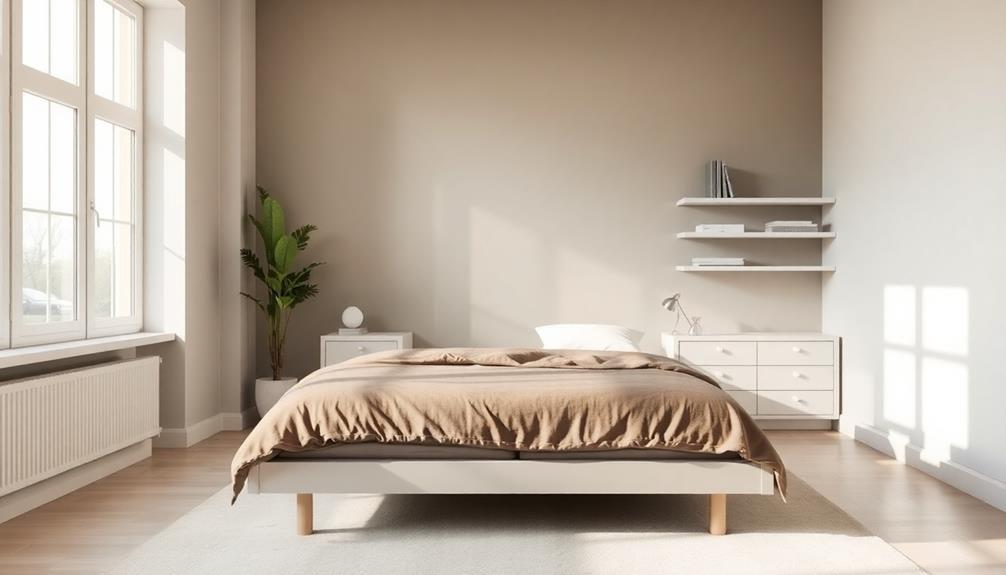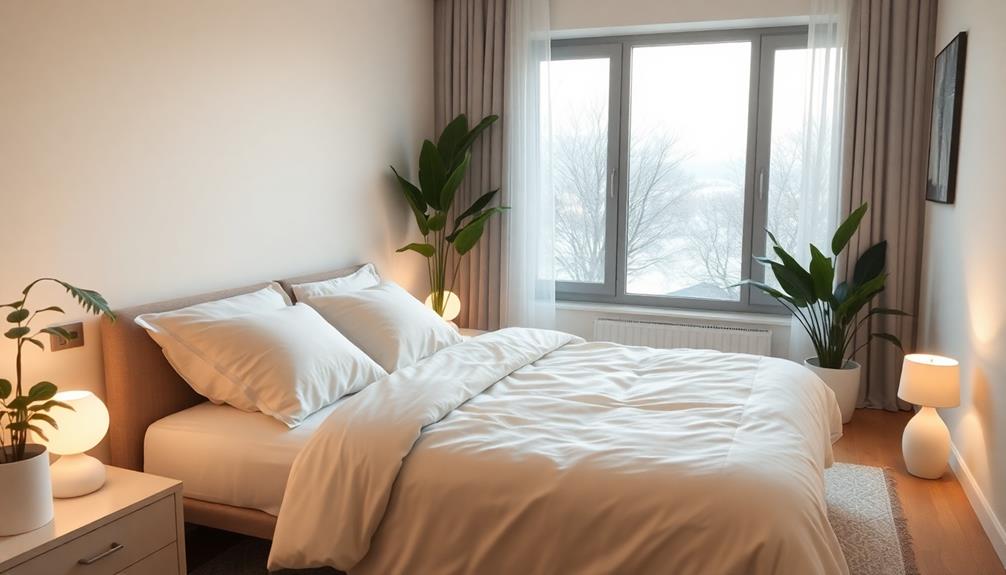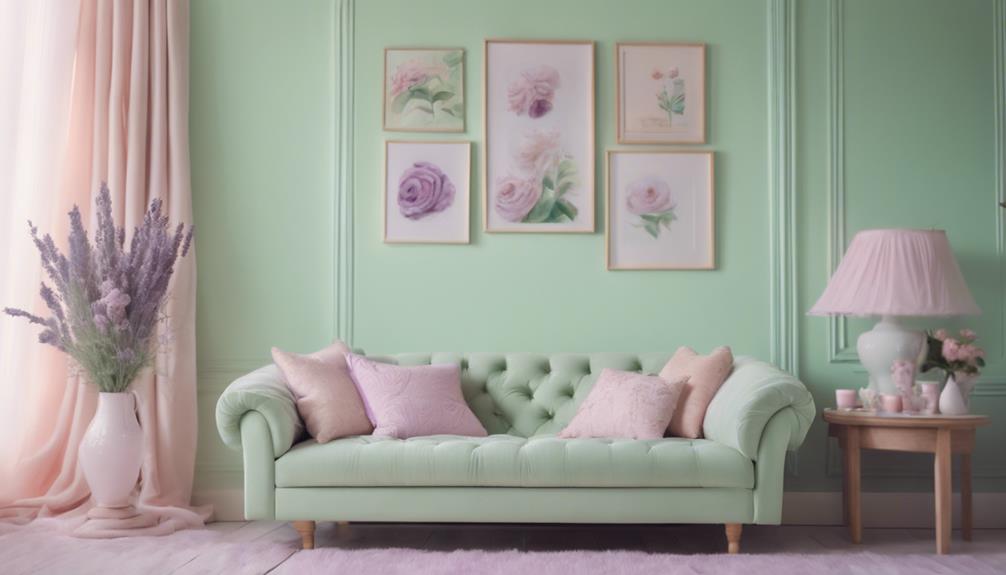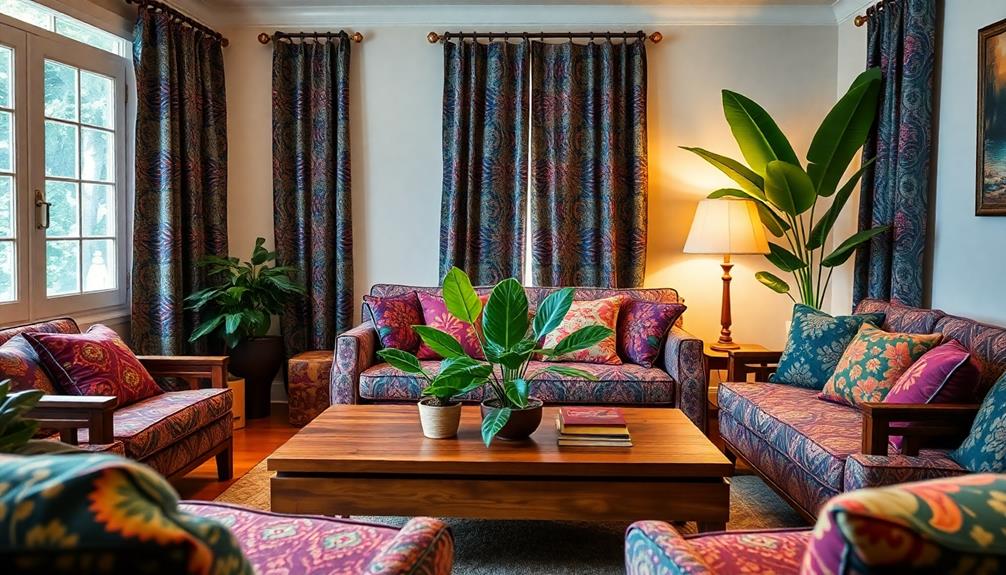To Feng Shui your bedroom for perfect sleep and relaxation, start by positioning your bed diagonally opposite the door for a sense of security. Keep the space clutter-free; this promotes better energy flow and tranquility. Choose calming colors like soft blues or muted earth tones on the walls and decor. Incorporate indoor plants for air quality and choose soothing lighting to create a relaxing ambiance. Mindfully place mirrors to avoid sleep disturbances, and guarantee your furniture arrangement promotes balance. Once you've tackled these basics, you'll find even more tips to enhance your peaceful retreat. To further enhance the space, consider incorporating natural materials like wood or bamboo to evoke a sense of grounding. Opt for light, breathable fabrics for your bedding to help maintain a serene atmosphere. By following these feng shui tips for tranquility, you can transform your bedroom into a harmonious sanctuary that nurtures rest and relaxation.
Key Takeaways
- Position the bed diagonally opposite the door against a solid wall to enhance visibility, stability, and positive energy flow.
- Keep the bedroom clutter-free to promote restful energy and allow Qi to circulate freely, avoiding storage under the bed.
- Choose soothing colors like soft blues and pastels for walls and decor to create a calming atmosphere conducive to relaxation.
- Limit mirrors in the bedroom and avoid placing them directly facing the bed to prevent negative energy and sleep disturbances.
- Incorporate indoor plants and natural materials for bedding to improve air quality and create a harmonious, serene environment.
Ideal Bedroom Layout

When designing your bedroom layout, positioning is key. To create an ideal bedroom layout that aligns with feng shui principles, position your bed diagonally opposite the door. This enhances visibility and creates a sense of security while avoiding direct alignment with the door, promoting better energy flow.
Incorporating elements of traditional Indonesian decor can also add warmth and character to your space. Make sure you have equal space on both sides of the bed by incorporating two bedside tables. This fosters balance and accessibility for both individuals, making your bedroom feel more inviting.
Keep your space clutter-free by avoiding storage under the bed. This allows for unobstructed energy circulation, promoting restful sleep and a peaceful ambiance.
Choosing soothing colors for your bedroom walls and decor is essential; opt for muted pastels or earth tones to cultivate a calming atmosphere.
Utilizing natural light can greatly enhance your bedroom's energy. Keep your windows unobstructed to let in sunlight and consider adding plants to improve air quality.
These elements work together to create a serene environment that supports relaxation and rejuvenation. By following these guidelines, you'll transform your bedroom into a harmonious retreat, perfect for restful sleep and tranquility.
Importance of Clutter-Free Space

A clutter-free bedroom plays a significant role in enhancing your sleep quality and overall well-being. When your space is clear of clutter, it promotes better energy flow, allowing Qi—the essential life force energy—to circulate freely. This not only reduces stress and anxiety but also creates a serene atmosphere that's crucial for achieving restful sleep.
Incorporating natural materials and soothing earth tones, as seen in Balinese interior design, can further enhance the tranquility of your space. Regular decluttering helps maintain this peaceful environment, so you can unwind and relax more easily.
Storing items under the bed? You might want to rethink that. It can trap negative energy and hinder proper circulation during sleep, disrupting your restorative sleep cycle. Instead, keep your bedroom dedicated to relaxation by separating work-related items from your resting space. This clear boundary fosters a more tranquil environment, allowing your mind to disconnect from daily stresses.
Ultimately, a clutter-free bedroom invites positive energy and enhances your ability to achieve restorative sleep. By prioritizing decluttering, you create a sanctuary that supports your well-being, helping you wake up refreshed and rejuvenated.
Embrace this simple yet effective change, and experience the profound impact it has on your overall quality of life.
Enhancing Air Quality and Light

To create a restful sleep environment, focus on enhancing both air quality and light in your bedroom. Start by opening windows during the day to improve fresh air circulation, which reduces indoor pollutants and promotes better sleep quality. Incorporating indoor plants, like snake plants and golden pothos, purifies the air and fosters a calming atmosphere. Regular cleaning and the use of air purification devices also contribute to better air quality, minimizing allergens and respiratory irritants.
Next, consider your light sources. Utilizing blackout curtains blocks excess light, encouraging melatonin production for deeper sleep. Positioning mirrors to reflect natural light can brighten dark corners, enhancing the overall energy of the space.
Here's a quick overview of tips to enhance air quality and light:
| Tip | Benefit | Implementation |
|---|---|---|
| Open windows | Improves air quality | Fresh air circulation |
| Add indoor plants | Purifies air | Snake plants, golden pothos |
| Use blackout curtains | Better sleep quality | Blocks excess light |
| Position mirrors | Enhances natural light | Brightens dark corners |
Color Choices for Relaxation

Creating a soothing atmosphere in your bedroom goes beyond air quality and light; color choices play a significant role in promoting relaxation and enhancing sleep quality. By selecting the right hues, you can foster a calming atmosphere that encourages tranquility and rejuvenation.
For instance, incorporating elements of nature through color can enhance the overall ambiance, drawing inspiration from luxury tropical designs that utilize high-quality materials and serene aesthetics.
Here are some tips for choosing colors that promote relaxation:
- Soft Blues: These shades help lower blood pressure and heart rate, creating a peaceful environment.
- Pastels: Light colors like soft pinks and lavenders evoke serenity and enhance emotional well-being.
- Neutral Colors: Shades like beige or cream on walls provide a neutral backdrop that encourages a soothing color palette.
- Cool Tones: Incorporate pale greens and soft blues to promote feelings of rejuvenation and peace.
Steer clear of aggressive colors like bright reds or purples, as they can energize your space and disrupt the tranquility needed for restful sleep.
Understanding the psychological effects of color will help you select hues that influence emotional states positively. By thoughtfully choosing your bedroom colors, you can create a serene environment that supports relaxation and improves sleep quality.
Furniture and Bed Placement

To create a restful environment, place your bed in a commanding position, ideally against a solid wall and diagonal from the door.
Incorporating unique decorative elements, such as traditional artistry like Indonesian decor masks, can enhance the energy in your space. This setup not only offers a sense of security but also encourages positive energy flow.
Additionally, guarantee your furniture arrangement is symmetrical and clutter-free to maintain harmony in the space.
Commanding Bed Position
A commanding bed position is essential for fostering a sense of safety and control in your bedroom. To achieve this, follow these guidelines for effective bed placement: Incorporating natural materials and a soothing color palette can enhance the overall ambiance of your space, creating a tranquil environment for sleep. This approach resonates with the principles of Traditional Indonesian Style Home Decor, which emphasizes harmony and relaxation.
- Face the Door: Position your bed so it faces the door, but not directly in line with it. This enhances your sense of control while allowing for a clear view of the entrance.
- Solid Wall Support: Place your headboard against a solid wall for stability and support. Avoid positioning your bed under windows or low beams to reduce feelings of pressure.
- Equal Accessibility: Confirm equal space on both sides of the bed for accessibility. This promotes balance and fosters a sense of partnership, especially in shared sleeping arrangements.
- Optimal Size: Choose a full-size or larger bed to facilitate proper chi circulation and provide ample relaxation space for both individuals. Avoid the "coffin position," where your feet point directly out the door, as it can negatively impact sleep quality and energy flow.
Optimal Furniture Arrangement
Ideal furniture arrangement in your bedroom plays an essential role in enhancing both comfort and energy flow. Start by positioning your bed diagonally opposite the door, which allows you to see who enters while maintaining a sense of security.
Avoid aligning the bed directly with the door to prevent negative energy flow that can disrupt your restful atmosphere.
Ensure your bed is against a solid wall to create a commanding position, while also steering clear of placements under windows or low beams to maintain stability and support. This setup fosters a sense of protection and comfort, vital for a good night's sleep.
Aim for equal space on both sides of the bed to promote accessibility and balance. This harmony not only enhances the room's aesthetic but also facilitates chi circulation, allowing positive energy to flow freely.
Opt for a full or queen-size bed to optimize comfort; smaller beds may limit energy flow, while larger beds can disrupt intimacy.
With these considerations, you'll create an inviting bedroom environment that supports relaxation and rejuvenation, setting the stage for perfect sleep.
Mindful Use of Mirrors

When it comes to mirrors in your bedroom, placement is key to creating a restful environment.
You'll want to avoid having mirrors directly reflect your bed, as this can stir up negative energy and feelings of unease.
Opt for round or oval shapes to symbolize harmony, and consider storing full-length mirrors in closet doors to keep the energy calm.
Mirror Placement Guidelines
Placing mirrors thoughtfully in your bedroom can greatly impact your sleep quality and overall sense of peace.
By adhering to specific placement guidelines, you can create a harmonious environment that fosters tranquility and restful sleep.
Here are four essential guidelines for mirror placement:
- Avoid Facing the Bed: Don't position mirrors directly facing your bed. This setup can generate overly active energy (yang), disrupting your ability to relax and enjoy restful sleep (yin).
- Choose Round or Oval Shapes: Opt for round or oval mirrors as they symbolize continuity and promote a more harmonious environment, enhancing the flow of positive energy.
- Position Full-Length Mirrors Wisely: Place full-length mirrors away from the bed to minimize reflections that might evoke feelings of loneliness or infidelity, which can disturb your peace.
- Limit Mirror Usage: Reducing the number of mirrors in your bedroom can greatly enhance tranquility, allowing for a more restful atmosphere.
Reflective Surfaces Impact
The impact of reflective surfaces in your bedroom can be significant, influencing both your mood and sleep quality. In Feng Shui, mirrors can create overly active energy (yang), disrupting the changeover to the restful energy (yin) needed for quality sleep. Placing mirrors directly in front of your bed may lead to sleep disturbances and feelings of loneliness or infidelity concerns.
To promote tranquility and relaxation, consider the following suggestions:
| Mirror Type | Placement Guidance |
|---|---|
| Round/Oval Mirrors | Promote continuity in relationships |
| Full-Length Mirrors | Position away from the bed to minimize disruption |
| Limited Mirrors | Enhance overall tranquility |
| Decorative Screens | Mitigate negative effects while providing functionality |
| Closet Door Mirrors | Keep them hidden when not in use |
Symbolism of Shapes
Reflective surfaces in your bedroom require mindful consideration, especially regarding the shapes of mirrors. In Feng Shui, the shapes of mirrors can greatly influence energy flow and create a tranquil environment conducive to sleep and relaxation.
To achieve harmony in your bedroom decor, consider the following:
- Round or Oval Mirrors: These shapes symbolize continuity and balance, promoting peaceful relationships and enhancing overall tranquility.
- Avoid Directly Facing the Bed: Mirrors positioned directly across from your bed can create restless energy, leading to feelings of loneliness or infidelity during sleep.
- Full-Length Mirrors: Place these mirrors away from the bed to maintain functionality while minimizing energy disruptions.
- Storage Solutions: Using closet doors for mirrors can limit their reflective impact, allowing for a serene atmosphere.
Incorporating Natural Elements

Creating a serene bedroom environment can be greatly enhanced by incorporating natural elements that promote relaxation. Start by adding indoor plants, like snake plants or jade plants, which not only improve air quality but also create a calming atmosphere. These green companions help to foster restful energy, making your space feel more inviting.
Choose natural materials in your bedding and decor, such as bamboo or organic cotton. These options align with Feng Shui principles, ensuring that your choices are ethical and non-toxic. Soft decor elements, like rounded stones or crystals, contribute to a soothing environment, enhancing tranquility and grounding your space.
Maximize natural light by opening your windows during the day. Fresh air and sunlight support positive energy flow, considerably boosting your mood and overall well-being.
However, avoid water features in your bedroom; they can disrupt restful energy. Instead, focus on decor that evokes warmth and serenity, creating a harmonious space that encourages relaxation.
Creating a Calming Ambience

Incorporating natural elements lays a solid foundation for a calming bedroom ambience. To enhance relaxation and promote restful sleep, consider these key elements:
- Color Palette: Use soft, muted colors like blues and greens. These hues lower blood pressure and create a tranquil environment, aligning with Feng Shui principles.
- Soft Lighting: Opt for low-light bulbs and candles. This type of lighting signals your body that it's time to wind down, fostering a soothing atmosphere.
- Artwork Selection: Choose artwork that evokes happiness and tranquility. Steer clear of aggressive imagery to maintain a peaceful vibe that supports your relaxation efforts.
- Natural Aromas and Air Quality: Incorporate plants and essential oils, such as lavender. They not only improve air quality but also create a calming scent environment, enhancing your bedroom's overall ambience.
Additionally, keep your space clutter-free. Regularly decluttering and utilizing smart storage solutions will enhance positive energy flow and reduce stress levels, contributing to a more relaxing room.
Feng Shui Tips to Avoid

When arranging your bedroom for ideal sleep, there are several Feng Shui pitfalls you should steer clear of.
First, avoid placing your bed directly in line with the door; this "coffin position" can provoke feelings of vulnerability and disrupt the restful energy you need.
Next, don't position mirrors facing the bed, as they can create overly active energy, hindering your shift to peaceful sleep and affecting personal relationships.
Steer clear of water features or images in the bedroom, as they introduce instability and emotional turbulence, which can disturb your serenity.
Additionally, make certain your bed isn't placed under low beams or sloped ceilings. These can create pressure, negatively impacting your sleep quality and relaxation.
Frequently Asked Questions
How Do You Sleep Better in a Bedroom Feng Shui?
To sleep better in your bedroom, position your bed for security, keep the space clutter-free, use calming colors, limit electronics, and incorporate natural elements like plants and essential oils for a serene atmosphere.
How Can I Make My Bedroom Calm and Relaxing?
Like a gentle breeze through an open window, you can create calm in your bedroom by using soothing colors, decluttering, adding plants, minimizing tech, and establishing a relaxing routine that invites peace and tranquility.
What Is the Feng Shui Rule for Bedrooms?
The feng shui rule for bedrooms emphasizes positioning your bed for security, keeping the space clutter-free, and ensuring balance with symmetry. Choose calming colors and avoid mirrors facing the bed to enhance relaxation and restful sleep.
What Is the Best Direction to Sleep in Feng Shui?
Did you know that sleeping south can enhance your rest? In feng shui, this direction promotes positive energy flow. Position your bed diagonally to the door for better visibility, creating a secure, restful environment.
Conclusion
By applying these feng shui principles, you can transform your bedroom into a serene sanctuary that promotes restful sleep and relaxation. For example, a couple in a busy city found that rearranging their bed to face the door and decluttering their space led to noticeably improved sleep quality and less stress. Embrace these tips to create a harmonious environment that nurtures your well-being, allowing you to wake up refreshed and rejuvenated each day.









